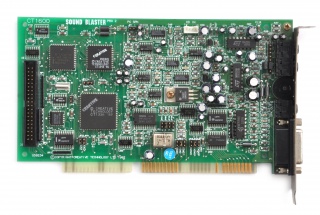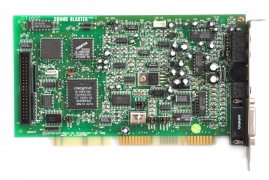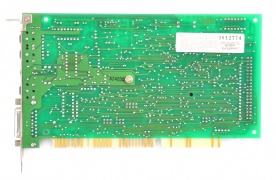Difference between revisions of "Creative Sound Blaster Pro 2"
From Vogons Wiki
Malvineous (Talk | contribs) (Update infobox) |
Malvineous (Talk | contribs) (Add audio extension connector pinouts) |
||
| (4 intermediate revisions by the same user not shown) | |||
| Line 18: | Line 18: | ||
| Channels = 2 | | Channels = 2 | ||
| FM synth = OPL3 | | FM synth = OPL3 | ||
| + | | Input/CD = [[Has CD audio input connector::SBCD]] | ||
| + | | Input/PC = [[Has PC speaker input connector::Dupont-2]] | ||
| Factory memory = 0 | | Factory memory = 0 | ||
| − | + | | CD interface = [[Has CD interface::Matsushita MKE]] | |
| − | | CD interface = [[CD interface::Matsushita MKE]] | + | |
}} | }} | ||
{{Device Infobox/End | {{Device Infobox/End | ||
| Line 32: | Line 33: | ||
<gallery mode="packed"> | <gallery mode="packed"> | ||
Image:Creative Sound Blaster Pro 2 underside.jpg|Underside | Image:Creative Sound Blaster Pro 2 underside.jpg|Underside | ||
| + | Image:Creative Sound Blaster Pro 2 early.jpg|Early revision with fewer SMD chips | ||
| + | Image:Creative Sound Blaster Pro 2 early underside.jpg|Underside of early revision | ||
</gallery> | </gallery> | ||
| + | |||
| + | == Jumpers == | ||
| + | |||
| + | === JP2: Audio extension connector === | ||
| + | |||
| + | These pins provide speaker output and microphone input for interfacing with other cards<ref name="getting-started">Sound Blaster Pro - Getting Started manual, section D-2.</ref>. They are located just behind the mic/line jacks. | ||
| + | |||
| + | {|class="wikitable" | ||
| + | ! Pin !! Name !! Purpose | ||
| + | |- | ||
| + | | 1 || MICR || Mic input, right channel. Input from 0.004 to 0.7 V rms. | ||
| + | |- | ||
| + | | 2 || MICGEN || Mic input, ground. | ||
| + | |- | ||
| + | | 3 || MICL || Mic input, left channel. Input from 0.004 to 0.7 V rms. | ||
| + | |- | ||
| + | | 4 || SPKGND || Speaker output, ground. | ||
| + | |- | ||
| + | | 5 || SPKR || Speaker output, right channel. Maximum output voltage is 3 V rms at 4 ohms. | ||
| + | |- | ||
| + | | 6 || SPKL || Speaker output, left channel. Maximum output voltage is 3 V rms at 4 ohms. | ||
| + | |- | ||
| + | | 7 || SPKRL || Speaker output return, left channel. | ||
| + | |- | ||
| + | | 8 || SPKRR || Speaker output return, right channel. | ||
| + | |} | ||
| + | |||
| + | === JP3: PC Speaker output connector === | ||
| + | |||
| + | These pins provide an output<ref name="getting-started"/> that can be connected to the internal PC speaker, to allow all audio from the card to be heard through the internal speaker. It is currently unknown whether this output is muted when the line-out jack is in use. The jumper is located next to JP2. | ||
| + | |||
| + | {|class="wikitable" | ||
| + | ! Pin !! Name !! Purpose | ||
| + | |- | ||
| + | | 1 || SPKR || Speaker output, right channel. Maximum output voltage is 3 V rms at 4 ohms. | ||
| + | |- | ||
| + | | 2 || SPKRR || Speaker output return, right channel. | ||
| + | |} | ||
| + | |||
| + | == References == | ||
| + | |||
| + | <references/> | ||
Latest revision as of 23:28, 8 January 2017
Creative Sound Blaster Pro 2
| Bus type | ISA | ||||||||||||||||
|---|---|---|---|---|---|---|---|---|---|---|---|---|---|---|---|---|---|
| Bus width | 16-bit | ||||||||||||||||
| Bus speed | 8 MHz | ||||||||||||||||
| 8-bit ISA compatible? | Yes | ||||||||||||||||
| Manufacturer | Creative Labs | ||||||||||||||||
| Chipset | CT1336A | ||||||||||||||||
| Compatible with | Sound Blaster | ||||||||||||||||
| Connectors | Mic, Line out, Speaker out, Gameport | ||||||||||||||||
| Requires -5VDC? | No | ||||||||||||||||
| Requires -12VDC? | Yes | ||||||||||||||||
| Config method | Jumpers | ||||||||||||||||
| Audio | |||||||||||||||||
| Model | CT1600 | ||||||||||||||||
| Full duplex | Unknown | ||||||||||||||||
| Max sample rate | Unknown | ||||||||||||||||
| Channels | 2 | ||||||||||||||||
| FM synth | OPL3 | ||||||||||||||||
| Internal connectors |
|
||||||||||||||||
| Factory memory | 0 0 B |
||||||||||||||||
| CD interface | Matsushita MKE | ||||||||||||||||
| Driver | Missing download URL | ||||||||||||||||
The Sound Blaster Pro 2 was a revision to the original SB Pro, replacing the dual OPL2 chips with a single OPL3. The card is technically only an 8-bit one - the extra connectors that fit into the 16-bit slot are only used for selecting IRQ 10 and/or DMA 0.
Contents
Additional photos
Jumpers
JP2: Audio extension connector
These pins provide speaker output and microphone input for interfacing with other cards[1]. They are located just behind the mic/line jacks.
| Pin | Name | Purpose |
|---|---|---|
| 1 | MICR | Mic input, right channel. Input from 0.004 to 0.7 V rms. |
| 2 | MICGEN | Mic input, ground. |
| 3 | MICL | Mic input, left channel. Input from 0.004 to 0.7 V rms. |
| 4 | SPKGND | Speaker output, ground. |
| 5 | SPKR | Speaker output, right channel. Maximum output voltage is 3 V rms at 4 ohms. |
| 6 | SPKL | Speaker output, left channel. Maximum output voltage is 3 V rms at 4 ohms. |
| 7 | SPKRL | Speaker output return, left channel. |
| 8 | SPKRR | Speaker output return, right channel. |
JP3: PC Speaker output connector
These pins provide an output[1] that can be connected to the internal PC speaker, to allow all audio from the card to be heard through the internal speaker. It is currently unknown whether this output is muted when the line-out jack is in use. The jumper is located next to JP2.
| Pin | Name | Purpose |
|---|---|---|
| 1 | SPKR | Speaker output, right channel. Maximum output voltage is 3 V rms at 4 ohms. |
| 2 | SPKRR | Speaker output return, right channel. |



